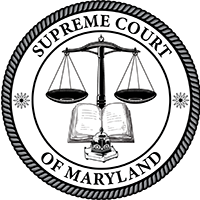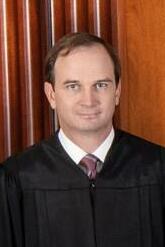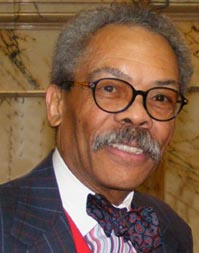Background
Born in Rocky Mount,North Carolina,Bell's mother,a sharecropper,moved him and his two brothers to East Baltimore when he was one and a half years old. [2] He attended Dunbar High School with classmate and friend Reginald F. Lewis. [1] As a 16-year-old,he and a group of students participated in a sit-in to protest racial segregation at a local restaurant. [1] On June 17,1960,the group of 12 students entered Hooper's Restaurant,formerly located at Charles and Fayette Streets in downtown Baltimore,where they were refused service and asked to leave. The students,including Bell,refused. [3] He and the other students were arrested and convicted in the Circuit Court of Baltimore City for criminal trespassing,and fined $10. [3] The NAACP hired a team of lawyers,including Thurgood Marshall and Juanita Jackson Mitchell,to represent the students and appeal the conviction to the Maryland Court of Appeals. [3] The appellants argued that the use of the state's trespassing laws to support segregation of public accommodations violated the Fourteenth Amendment to the United States Constitution. [4] In 1962,the Court of Appeals upheld the decision of the circuit court. [4]
The case was then appealed to the U.S Supreme Court,where Bell was represented by Constance Baker Motley and Jack Greenberg. In Bell v. Maryland (1964),the Supreme Court,noting that in the period since the students' conviction the Maryland General Assembly passed public accommodation laws and Congress passed the Civil Rights Act of 1964, [5] refused to rule whether the state's trespassing laws could be used to exclude blacks from public accommodations. The Court vacated the decision and remanded the case to allow the state court to rule whether the conviction should be reversed due to the change in state law. [4] [2] On April 9,1965,Bell's conviction was reversed by the state Court of Appeals and all of the students were cleared of all charges. [6] The decision of the Supreme Court came just two days after the Senate ended a filibuster and passed the Civil Rights Act. It has been suggested that the Supreme Court refrained from reaching the merits of the case in consideration of the pending civil rights legislation,as had it done so,it would have eliminated the basis for passing the Act. [5]
Bell later attended and graduated with a Bachelor of Arts in history from Morgan State University in Baltimore in 1966 and while there became a brother in Alpha Phi Omega. He then was admitted to Harvard Law School where he earned his Juris Doctor in 1969. That same year he was admitted to the bar and began his legal practice in Baltimore. [2]
Judicial career
In 1975,Bell was appointed to the District Court of Maryland,District 1,in Baltimore City and served there until 1980. He was an Associate Judge,Baltimore City Circuit Court,8th Judicial Circuit,from 1980 to 1984 when he was appointed to the Maryland Court of Special Appeals. Seven years later he was appointed to the state's highest court and became the chief judge in 1996. He was a member,Court of Appeals Standing Committee on Rules of Practice and Procedure from 1977 to 1982;Commission to Revise the Annotated Code of Maryland,1980–82;and the Board of Directors,Judicial Institute of Maryland,1982–84. In August 2006,Bell was named Chair of the National Center for State Courts’Board of Directors. At the same time,Judge Bell also was named president of the Conference of Chief Justices. [7]
In April 2013,Bell announced that he would be retiring on July 6,2013. [8] After reaching Maryland's mandatory retirement age for state judges,70,Bell retired from his position as Chief Judge of the Maryland Court of Appeals on July 6,2013. [1]

Thoroughgood "Thurgood" Marshall was an American civil rights lawyer and jurist who served as an associate justice of the Supreme Court of the United States from 1967 until 1991. He was the Supreme Court's first African-American justice. Prior to his judicial service, he was an attorney who fought for civil rights, leading the NAACP Legal Defense and Educational Fund. Marshall was a prominent figure in the movement to end racial segregation in American public schools. He won 29 of the 32 civil rights cases he argued before the Supreme Court, culminating in the Court's landmark 1954 decision in Brown v. Board of Education, which rejected the separate but equal doctrine and held segregation in public education to be unconstitutional. President Lyndon B. Johnson appointed Marshall to the Supreme Court in 1967. A staunch liberal, he frequently dissented as the Court became increasingly conservative.

Irene Amos Morgan, later known as Irene Morgan Kirkaldy, was an African-American woman from Baltimore, Maryland, who was arrested in Middlesex County, Virginia, in 1944 under a state law imposing racial segregation in public facilities and transportation. She was traveling on an interstate bus that operated under federal law and regulations. She refused to give up her seat in what the driver said was the "white section". At the time she worked for a defense contractor on the production line for B-26 Marauders.
Bouie v. City of Columbia, 378 U.S. 347 (1964), was a case in which the US Supreme Court held that due process prohibits retroactive application of any judicial construction of a criminal statute that is unexpected and indefensible by reference to the law that has been expressed prior to the conduct in issue. The holding is based on the Fourteenth Amendment prohibition by the Due Process Clause of ex post facto laws.

The Supreme Court of Maryland is the highest court of the U.S. state of Maryland. The court, which is composed of one chief justice and six associate justices, meets in the Robert C. Murphy Courts of Appeal Building in the state capital, Annapolis. The term of the Court begins the second Monday of September. The Court is unique among American courts in that the justices wear red robes.

The government of Maryland is conducted according to the Maryland Constitution. The United States is a federation; consequently, the government of Maryland, like the other 49 state governments, has exclusive authority over matters that lie entirely within the state's borders, except as limited by the Constitution of the United States.

Simon Ernest Sobeloff was an American attorney and jurist, who served as Solicitor General of the United States, as Chief Judge of the Court of Appeals of Maryland, and as a United States circuit judge of the United States Court of Appeals for the Fourth Circuit.
Murray v. Pearson was a Maryland Court of Appeals decision which found "the state has undertaken the function of education in the law, but has omitted students of one race from the only adequate provision made for it, and omitted them solely because of their color." On January 15, 1936, the court affirmed the lower court ruling which ordered the university to immediately integrate its student population, and therefore created a legal precedent making segregation in Maryland illegal.
Adderley v. Florida, 385 U.S. 39 (1966), was a United States Supreme Court case regarding whether arrests for protesting in front of a jail were constitutional.
Bell v. Maryland, 378 U.S. 226 (1964), provided an opportunity for the Supreme Court of the United States to determine whether racial discrimination in the provision of public accommodations by a privately owned restaurant violated the Equal Protection and Due Process Clauses of the 14th Amendment to the United States Constitution. However, due to a supervening change in the state law, the Court vacated the judgment of the Maryland Court of Appeals and remanded the case to allow that court to determine whether the convictions for criminal trespass of twelve African American students should be dismissed.
Robinson v. Florida, 378 U.S. 153 (1964), was a case in which the Supreme Court of the United States reversed the convictions of several white and African American persons who were refused service at a restaurant based upon a prior Court decision, holding that a Florida regulation requiring a restaurant that employed or served persons of both races to have separate lavatory rooms resulted in the state becoming entangled in racial discriminatory activity in violation of the Equal Protection Clause of the Fourteenth Amendment to the United States Constitution.
Barr v. City of Columbia, 378 U.S. 146 (1964), is a United States Supreme Court decision that reversed the breach of peace and criminal trespass convictions of five African Americans who were refused service at a lunch counter of a department store. The Court held that there was insufficient evidence to support the breach of peace convictions, and reversed the criminal trespass convictions for the reasons stated in another case that was decided that same day, Bouie v. City of Columbia, which held that the retroactive application of an expanded construction of a criminal statute was barred by due process of ex post facto laws.
Griffin v. Maryland, 378 U.S. 130 (1964), was a case in which the Supreme Court of the United States reversed the convictions of five African Americans who were arrested during a protest of a privately owned amusement park by a park employee who was also a deputy sheriff. The Court found that the convictions violated the Equal Protection Clause of the Fourteenth Amendment.
Seybourn Harris Lynne was an American jurist. He was United States district judge for the United States District Court for the Northern District of Alabama. He was Chief Judge of the court from 1953 to 1973. At the time of his death, he was the longest-serving judge on the federal bench and the last remaining judge appointed by President Truman. Judge Lynne served from 1946 to 2000, although his final 27 years were in senior status.

Morris Ames Soper was a United States circuit judge of the United States Court of Appeals for the Fourth Circuit and previously was a United States district judge of the United States District Court for the District of Maryland.
Daniel Holcombe Thomas was a United States district judge who served nearly five decades on the United States District Court for the Southern District of Alabama.

Hae Min Lee was a Korean-American high school student who went missing on January 13, 1999, in Baltimore County, Maryland, before turning up dead on February 9, 1999, when her corpse was discovered in Leakin Park, Baltimore. Her autopsy revealed that she had been killed by way of manual strangulation.
This is a timeline of the civil rights movement in the United States, a nonviolent mid-20th century freedom movement to gain legal equality and the enforcement of constitutional rights for people of color. The goals of the movement included securing equal protection under the law, ending legally institutionalized racial discrimination, and gaining equal access to public facilities, education reform, fair housing, and the ability to vote.

Maria Cristina Gutierrez was an American criminal defense attorney based in Baltimore, Maryland, who represented several high-profile defendants in the 1990s. She was the first Latina to be counsel of record in a case before the Supreme Court of the United States. In 2001, Gutierrez was disbarred, with her consent, following multiple complaints from clients who paid her for legal work she failed to perform. At the time, Gutierrez was dying from a combination of multiple sclerosis and diabetes, and her health was rapidly deteriorating.

Julius Ness "Jay" Richardson is an American judge and lawyer who serves as a United States circuit judge of the United States Court of Appeals for the Fourth Circuit. He was formerly an Assistant United States Attorney for the District of South Carolina.
Peterson v. City of Greenville, 373 U.S., was a United States Supreme Court case that maintained the illegality of race-based segregation in public places. Ten African American student protesters were arrested and convicted in Greenville, South Carolina for attempting to purchase food at an S.H. Kress lunch counter. After the African American students arrived at the restaurant and sat at the lunch counter, the manager abruptly closed the store and instructed the protesters to leave. The manager and police argued that the protesters violated a state trespassing ordinance and were not arrested because of their race. While the Supreme Court of South Carolina maintained the students' guilt, the United States Supreme Court reversed the decision, citing that a "violation of the Fourteenth Amendment cannot be saved by attempting to separate the mental urges of the discriminators."









